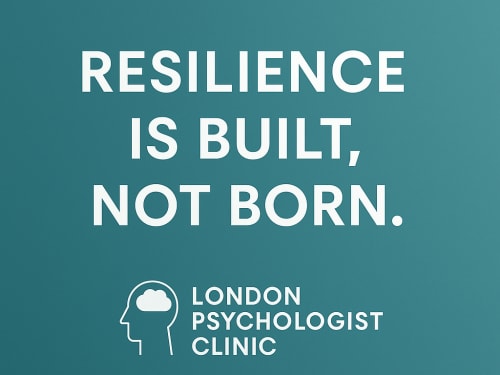Resliliance Is Built Not Born

posted 4th August 2025
Resilience Is Built, Not Born: Reframing Mental Strength Through Psychology
In our culture of self-sufficiency, we often admire people who seem naturally “resilient.” They bounce back quickly, keep calm in crises, and push through adversity. But is this inner strength something you're born with — or something you build?
At the London Psychologist Clinic, we often help clients unlearn the damaging idea that resilience is a fixed trait. In truth, resilience is not innate. It is a set of psychological, emotional, and behavioural skills that can be cultivated — often most effectively with the support of a trained psychologist.
What Is Resilience, Really?
Resilience is defined by the American Psychological Association as "the process of adapting well in the face of adversity, trauma, tragedy, threats or significant sources of stress." It's not about being immune to pain or never struggling. It’s about how you respond.
Resilient individuals still feel sadness, anger, and fear — they just don’t remain stuck there. What sets them apart is how they recover, reframe, and regain control.
The Myth of the ‘Resilient Personality’
While certain traits like optimism, emotional regulation, and problem-solving can support resilience, research consistently shows that environmental, relational, and behavioural factors play a larger role than genetics alone.
A 2013 study in Clinical Psychology Review found that resilience is highly influenced by social support, cognitive flexibility, and learned coping strategies — not by innate personality traits.
So if you’ve ever told yourself, “I’m just not resilient,” understand this: You weren’t born without it. You may simply have never been shown how to build it.
Building Resilience Through CBT and Psychological Insight
One of the most effective tools for developing resilience is Cognitive Behavioural Therapy (CBT). CBT teaches us how to recognise and challenge negative thought patterns, particularly those that fuel helplessness, catastrophising, or avoidance.
Here’s how psychological interventions help cultivate resilience:
Reframing Stress: Learning to view challenges as temporary and solvable, rather than overwhelming and permanent
Behavioural Activation: Encouraging movement, structure, and achievement even when motivation is low
Mindfulness and Regulation: Teaching techniques to tolerate discomfort and remain grounded in the present
Problem Solving: Developing strategies for effective decision-making under stress
CBT doesn’t just help you cope; it helps you grow stronger in the face of adversity.
Small Habits, Big Impact
Building resilience doesn’t require life-changing breakthroughs overnight. Instead, it comes from consistent, intentional habits:
- Getting enough sleep
- Maintaining structure
- Reducing rumination through journaling or thought diaries
- Reaching out for support (even when it’s hard)
- Challenging “all or nothing” thinking
A 2019 UK study published in BMC Psychiatry found that individuals with anxiety and depression who learned even a few CBT-based coping skills showed significant improvement in functioning and resilience over six months.
Why It’s Never Too Late to Build Resilience
We see clients in their 20s and their 70s who are only just beginning to develop the psychological tools that build resilience. It is never too late.
Whether you’ve faced burnout, bereavement, trauma, or chronic stress, the first step is recognising that resilience is not a quality you lack — it is a skill you can learn.
Rebuilding from the Inside Out
At London Psychologist Clinic, we work with clients every day who are in the process of learning resilience — not through willpower alone, but through guided psychological support. If you feel that life’s setbacks keep knocking you down harder than they should, we can help you understand why — and more importantly, how to change it.
You don’t need to do it all alone. The strength you admire in others? It’s not luck or talent. It’s learned, and it’s within your reach.



